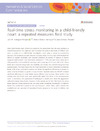Identificador persistente para citar o vincular este elemento:
https://accedacris.ulpgc.es/jspui/handle/10553/132149
| Título: | Real-time stress monitoring in a child-friendly court: a repeated measures field study | Autores/as: | Rodríguez Pellejero, José Manuel Mulero Henríquez, Itahisa Santana Amador, Zaira del Carmen |
Clasificación UNESCO: | 6102 Psicología del niño y del adolescente 6105 Evaluación y diagnóstico en psicología |
Palabras clave: | Heart-Rate-Variability Criminal Court Biofeedback Testimony Anxiety, et al. |
Fecha de publicación: | 2024 | Proyectos: | Psicología Forense | Publicación seriada: | Humanities & Social Sciences Communications | Resumen: | Most child-friendly court reforms are based on the assumption that the court setting is a stressful experience. Our objective was to analyze the acute stress levels of children who come to testify in a child-friendly investigative court using a person-by-environment approach. We employed a simple repeated measures design for this study, which included 42 minors of Spanish nationality who provided testimony as victims of violence in Spain’s inaugural Child-Friendly Court. Among the participants, 73.8% were girls with a mean age of 12.5 years (SD = 3.4), and 26.2% were boys with a mean age of 11.4 years (SD = 3.1). Stress levels were measured using heart rate variability, and anxiety was assessed using state-trait questionnaires. The study found that the mean percentile of anxiety remained at moderate levels, while stress remained at medium-low levels. No significant differences in anxiety or stress were found based on gender or type of crime. Repeated measures ANOVA revealed significant differences in stress levels among different court settings. Stress levels in the waiting room and Gesell room were significantly higher than those in the decompression room. In conclusion, the experience of testifying in a Gesell room about the aggressions suffered increases stress levels. However, in this sample and for this Pilot Court, the stress levels observed during testimony did not reach levels considered detrimental to children’s health. Our results lend support to the new European Judicial Policy, which includes the establishment and operation of Specialized Courts adapted to the needs of children and adolescents. | URI: | https://accedacris.ulpgc.es/handle/10553/132149 | ISSN: | 2662-9992 | DOI: | 10.1057/s41599-024-03410-w | Fuente: | Humanities and Social Sciences Communications[EISSN 2662-9992],v. 11 (1), (Diciembre 2024) |
| Colección: | Artículos |
Visitas
9
actualizado el 11-ene-2026
Descargas
4
actualizado el 11-ene-2026
Google ScholarTM
Verifica
Altmetric
Comparte
Exporta metadatos
Los elementos en ULPGC accedaCRIS están protegidos por derechos de autor con todos los derechos reservados, a menos que se indique lo contrario.
